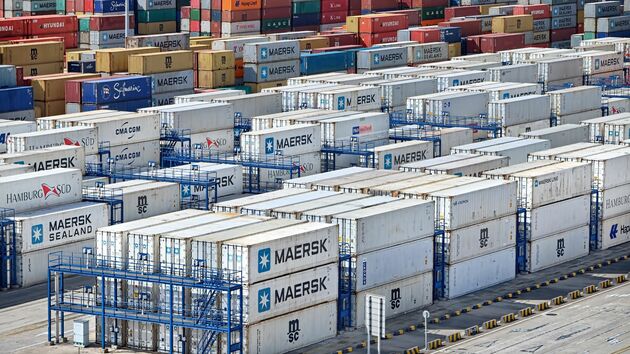
Image:Freek van Arkel
In a collaborative effort since 2021, the Port of Rotterdam, Customs, GroentenFruit Huis, and Portbase have been working towards further digitizing customs processes to streamline the inspections of (reefer) containers, aiming to reduce waiting times and prevent unnecessary costs. What progress has been made since then, and what lessons have these partners learned? What lies ahead in this transformative journey?
A Growing Need for Efficiency
The Rotterdam port has seen a steady increase in the shipment of reefer containers over the years. Currently, one in every seven containers handled in Rotterdam is a reefer container, and this number is projected to rise. This surge, particularly in the tropical fruit sector, comes with its challenges. Escalating waiting times and additional costs are direct consequences of the growing number of containers requiring scanning.
Customs Scanning
All major container terminals on the Maasvlakte in Rotterdam now boast high-tech customs scanning capabilities on-site. Customs remotely analyze container content images 24/7. This advancement has resulted in an impressive 95% of containers being released within 36 hours after unloading, without the need for them to leave the premises or undergo unnecessary openings.
Tangible Benefits
The digitalization drive has yielded substantial benefits for cargo owners and end-customers. Shippers report significantly shorter inspection process times, with a reduction of over 30% in overall processing time. The Customs and Port Authority have seen a remarkable decrease in complaints, by up to 80%. These complaints, which also require time for resolution, have been significantly mitigated
Addressing Food Waste Concerns
While economic value is crucial, the GroentenFruit Huis, representing companies in the vegetable and fruit sector, emphasizes the growing importance of preventing food wastage. With stricter regulations on production, the need for faster inspections, minimal wait times, and fewer disruptions has heightened. For products like fruits and vegetables, which are becoming increasingly susceptible due to reduced use of pesticides, swift processing is paramount.
Enhancing Communication and Safety
Ensuring safety in handling (reefer) containers from South America has become an escalating concern due to drug smuggling and illicit activities. Digitalization of customs processes aids in minimizing wait times, improving chain efficiency, and bolstering security. The efficient exchange of information through the Port Community System (PCS) of Portbase in Rotterdam plays a pivotal role in combating data fraud and hampering the illegal retrieval of (drug) containers.
While significant strides have been made, the collaborating parties stress that the ultimate aim remains process optimization. Regular physical meetings, ranging from 6 to 8 times a year, have fostered a deeper understanding of each other’s situations, ultimately contributing to the project’s success. This collaborative spirit is essential for achieving a seamless chain with minimal costs and disruptions.
With enhanced cooperation and continued digitalization, a wealth of data is now available. This data provides invaluable insights and enables proactive measures. Predictions based on historical data are now feasible, and potential issues can be substantiated, thanks to tools like the Customs Dashboard. This data-driven approach is a significant leap forward, ensuring that actions are guided by tangible business value.
Benefits Across the Board
The ongoing digitalization and improved collaboration benefit all stakeholders. Customs and terminals gain better insights into capacities, allowing for more efficient planning of inspection processes. However, there is still room for improvement, particularly in the detailed filling of digital customs documents. While acknowledging the sensitivity of certain information, more comprehensive sharing could further enhance the efficiency of inspections.
Future Prospects
The involved parties remain committed to their data-driven approach, with a continued focus on scrutinizing various processes in Rotterdam. One potential next step could be prioritizing reefer inspections throughout the entire chain. The journey continues.
Source:Port of Rottredam

